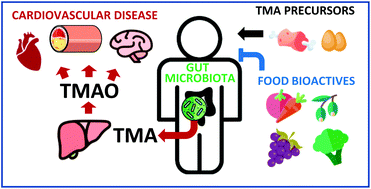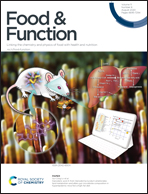Dietary bioactive ingredients to modulate the gut microbiota-derived metabolite TMAO. New opportunities for functional food development
Abstract
There is a growing body of clinical evidence that supports a strong association between elevated circulating trimethylamine N-oxide (TMAO) levels with increased risk of developing adverse cardiovascular outcomes such as atherosclerosis and thrombosis. TMAO is synthesized through a meta-organismal stepwise process that involves (i) the microbial production of TMA in the gut from dietary precursors and (ii) its subsequent oxidation to TMAO by flavin-containing monooxygenases in the liver. Choline, L-carnitine, betaine, and other TMA-containing compounds are the major dietary precursors of TMA. TMAO can also be absorbed directly from the gastrointestinal tract after the intake of TMAO-rich foods such as fish and shellfish. Thus, diet is an important factor as it provides the nutritional precursors to eventually produce TMAO. A number of studies have attempted to associate circulating TMAO levels with the consumption of diets rich in these foods. On the other hand, there is growing interest for the development of novel food ingredients that reduce either the TMAO-induced damage or the endogenous TMAO levels through the interference with microbiota and host metabolic processes involved in TMAO pathway. Such novel functional food ingredients would offer great opportunities to control circulating TMAO levels or its effects, and potentially contribute to decrease cardiovascular risk. In this review we summarize and discuss current data regarding the effects of TMA precursors-enriched foods or diets on circulating TMAO levels, and recent findings regarding the circulating TMAO-lowering effects of specific foods, food constituents and phytochemicals found in herbs, individually or in extracts, and their potential beneficial effect for cardiovascular health.

- This article is part of the themed collections: Recent Review Articles, Food & Function Recent HOT articles and Food & Function Recent Open Access Articles


 Please wait while we load your content...
Please wait while we load your content...